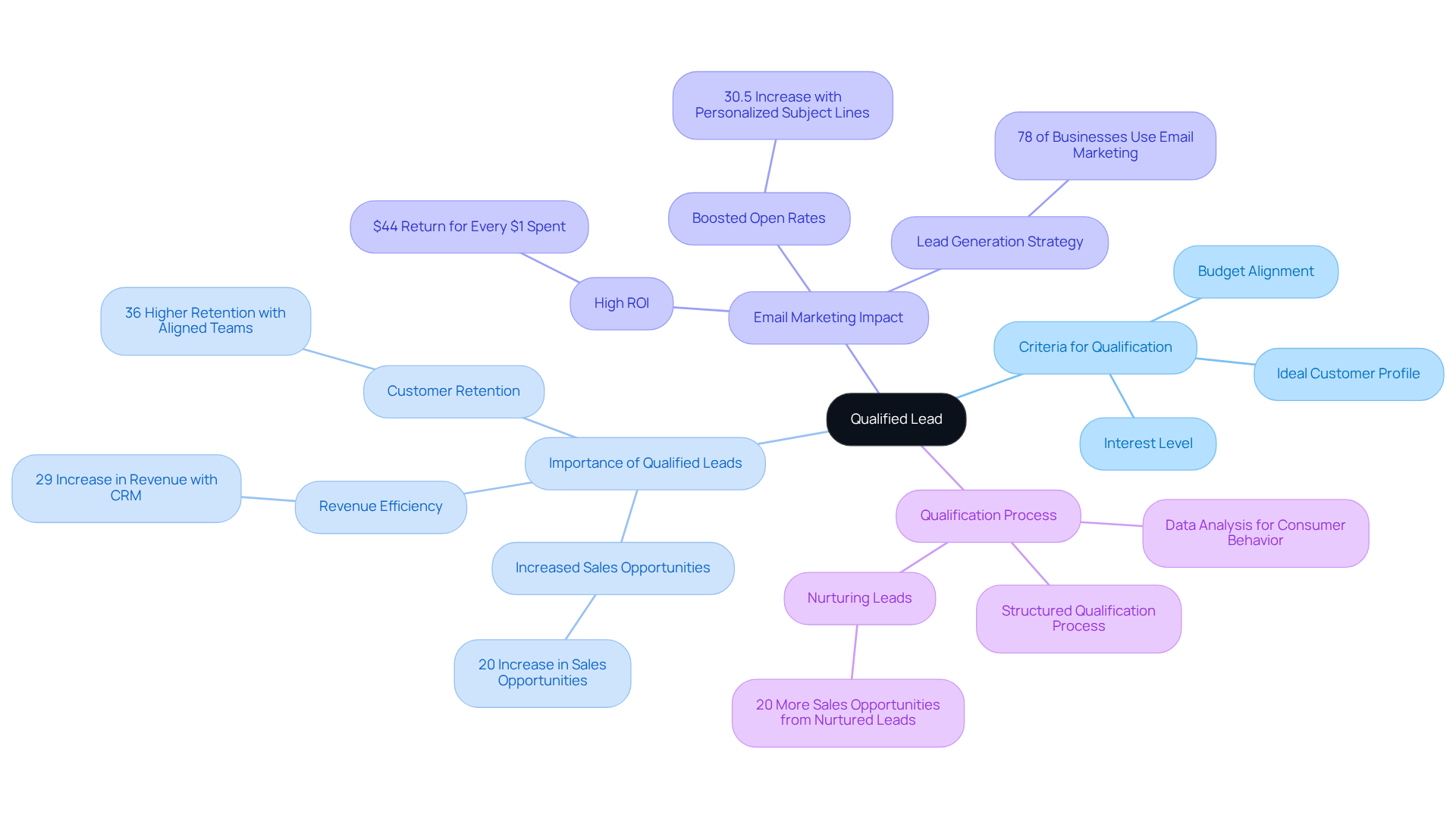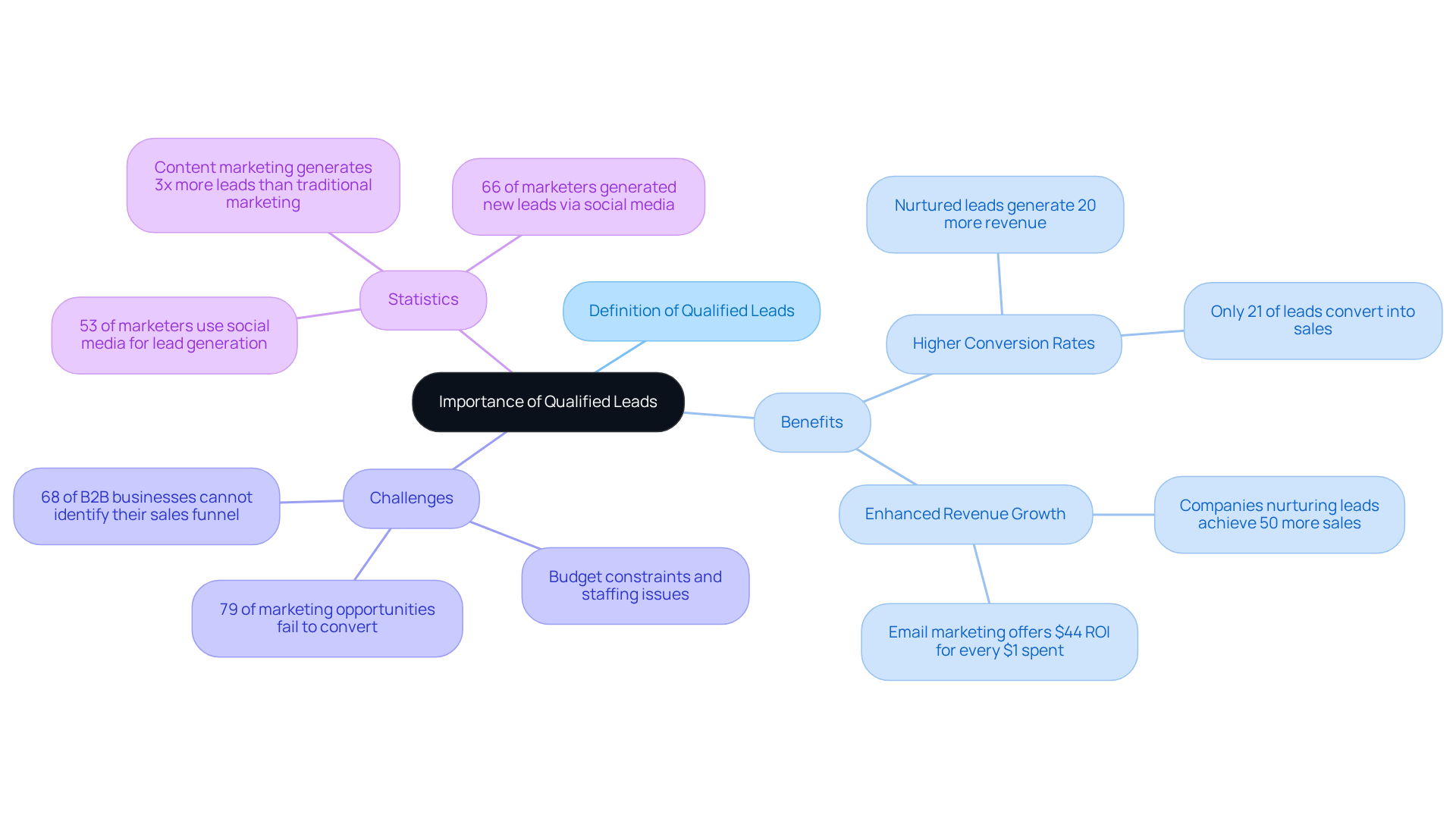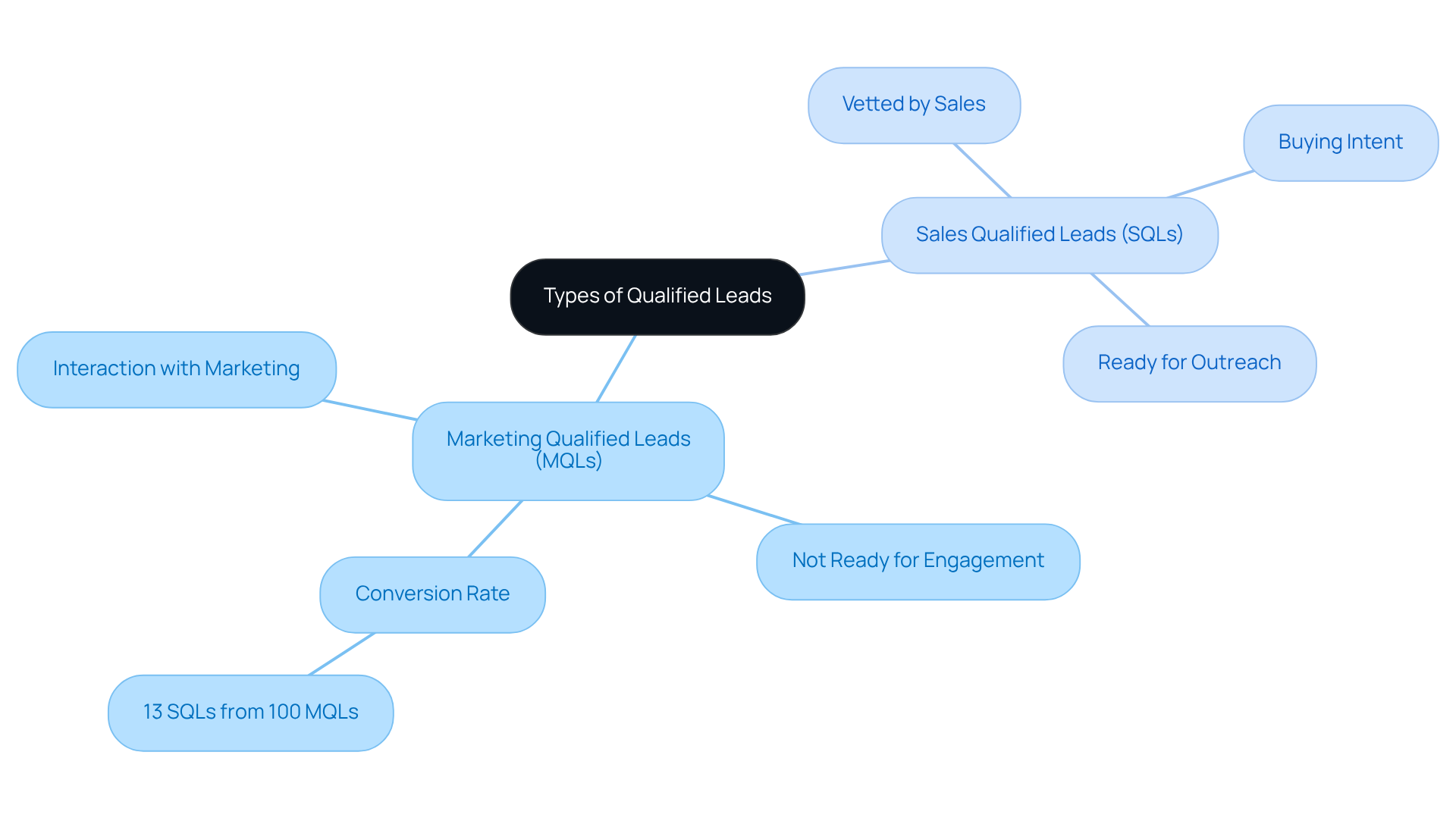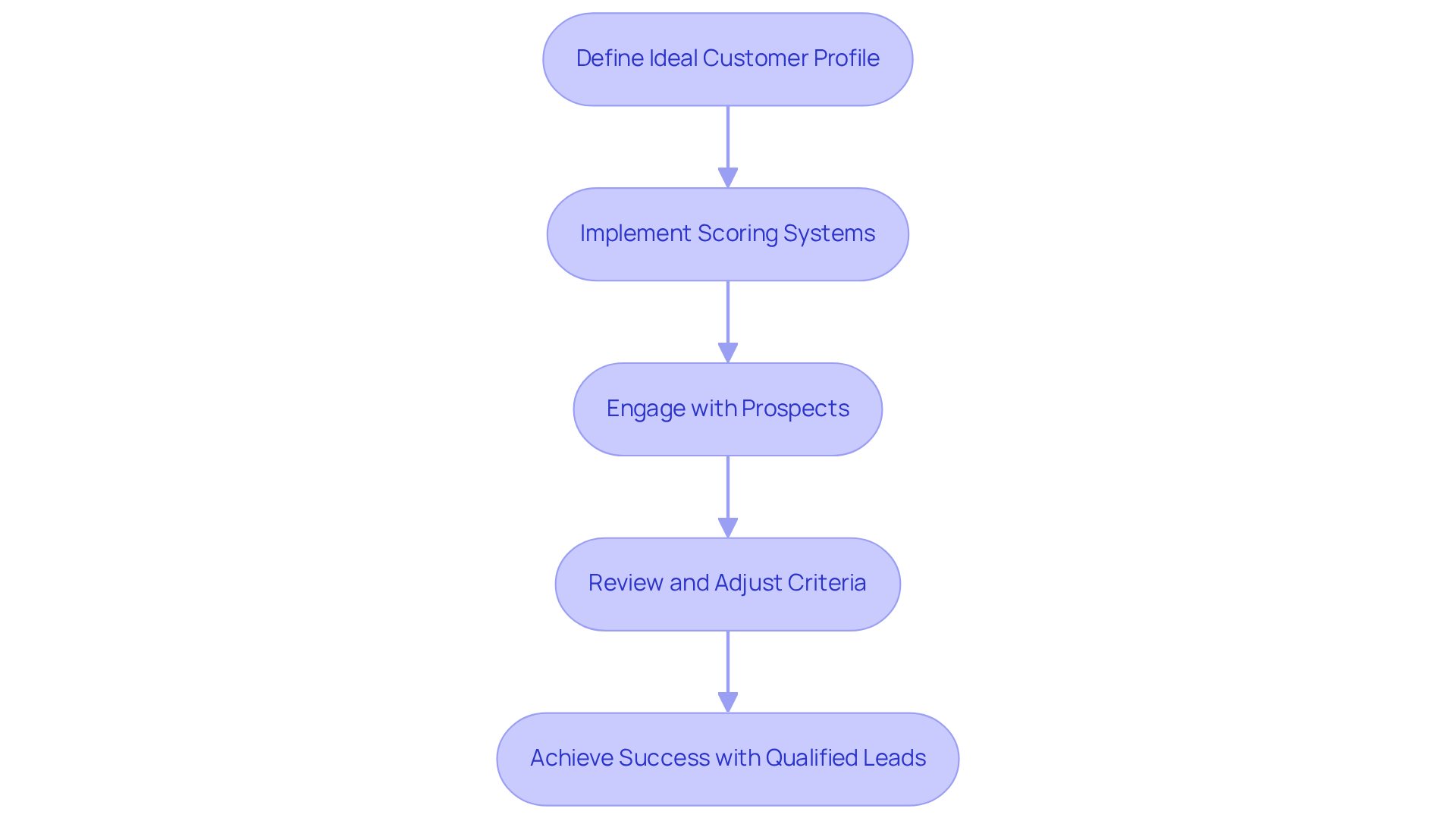Overview
Qualified leads represent potential clients who fulfill specific criteria, indicating a greater likelihood of making a purchase. This focus on qualified leads not only enhances sales efficiency for small business owners but also nurtures a path towards growth. By distinguishing between Marketing Qualified Leads (MQLs) and Sales Qualified Leads (SQLs), we can significantly improve conversion rates and foster revenue growth. Did you know that nurtured leads can generate up to 20% more revenue? This statistic underscores the importance of prioritizing these leads.
As small business owners, we understand the challenges you face in navigating the sales landscape. By concentrating on qualified leads, you can more effectively channel your efforts, ensuring that each interaction counts. Imagine the potential for your business when you focus on those who are already interested and engaged. Together, we can achieve success by implementing strategies that resonate with your audience's needs.
In conclusion, embracing qualified leads is not just a strategy; it’s a commitment to nurturing relationships that lead to sustainable growth. Let’s take this journey together, focusing on what truly matters for your business and the clients you serve.
Introduction
Understanding the nuances of a qualified lead can truly transform how small business owners approach their sales strategies. By focusing on prospects who not only express interest but also meet specific criteria, businesses can significantly boost their chances of conversion and revenue growth. Yet, with many marketing efforts falling short, a pressing question emerges: how can small business owners effectively identify and nurture these valuable leads, especially when faced with the challenges of limited resources and knowledge? Together, we can navigate these complexities and find solutions that empower your business.
Define Qualified Lead: Understanding the Basics
A suitable prospect is a potential client who meets specific criteria, allowing us to understand what is a qualified lead with a higher likelihood of making a purchase. This classification is essential for understanding what is a qualified lead, as it is based on factors such as interest level, budget, and alignment with your company's ideal customer profile. Unlike typical prospects, who may simply show some interest, undergo a screening process that significantly boosts their chances of becoming paying customers. This distinction is crucial for small business owners, as focusing on suitable prospects can greatly enhance both revenue efficiency and effectiveness.
The importance of competent prospects cannot be overstated; they represent a more strategic approach to business. For instance, businesses that prioritize developing skilled prospects often see a 20% increase in sales opportunities. Furthermore, 44% of B2B marketers indicate that email marketing is an essential tool for generating these high-quality prospects, underscoring the power of targeted outreach. This highlights the need for small business owners to integrate email marketing into their customer acquisition strategies.
To effectively identify suitable prospects, consider leveraging data analysis to understand consumer behavior and preferences, which can refine your ideal customer profile. Additionally, implementing a structured qualification process can help your company identify what is a qualified lead that is more likely to convert. Businesses that utilize CRM software can experience up to a 29% increase in revenue, illustrating the importance of effective prospect management tools in identifying and nurturing suitable prospects. As industry experts suggest, aligning sales and marketing efforts can lead to a 36% boost in customer retention, further emphasizing the role of qualified prospects in fostering sustainable growth.
Addressing the challenges that small business owners face in client acquisition is vital, especially since many lack the resources or knowledge to successfully implement traditional marketing techniques. Together, we can navigate these hurdles and work towards achieving success.

Importance of Qualified Leads in Sales Strategy
Understanding what is a is essential for a successful marketing approach, as qualified prospects indicate individuals who are more likely to convert. For small business owners, concentrating on the right contacts allows for a more efficient use of limited resources, ultimately saving time and energy that would otherwise be spent on unsuitable prospects. This focus not only improves conversion rates but also significantly enhances revenue growth. Did you know that nurtured prospects can generate 20% more revenue? This statistic highlights the importance of building strong connections, which in turn fosters customer loyalty, as these prospects often contribute to larger transactions.
Moreover, with a staggering 79% of marketing opportunities failing to convert into sales, it becomes clear that understanding what is a qualified lead is vital for managing sales efforts around qualified prospects and achieving sustainable growth. By addressing the challenges that small business owners face in attracting clients and managing outreach, we can work together to achieve a greater return on investment. Remember, you are not alone in this journey; we understand your challenges, and together we can pave the way to success.

Types of Qualified Leads: MQLs vs. SQLs
Qualified prospects fall into two key categories: Marketing Qualified Prospects (MQLs) and Sales Qualified Prospects (SQLs). MQLs are those who have interacted with a company's marketing efforts—perhaps by downloading resources or subscribing to newsletters. While their interest is clear, they may not yet be ready for immediate engagement. On the other hand, SQLs are prospects that have been thoroughly vetted by the sales team and are recognized as ready for direct outreach. These individuals have shown clear buying intent, making them a priority for sales initiatives.
For small business owners looking to refine their outreach strategies, understanding what is a qualified lead and the distinction between MQLs and SQLs is vital. For instance, studies indicate that for every 100 MQLs, marketing campaigns should ideally yield at least 13 successful SQLs. This statistic underscores the importance of efficient qualification processes. Moreover, 61% of B2B marketers send all prospects directly to the sales team, despite only 27% being qualified. This highlights the critical role of effective prospect qualification, specifically understanding what is a qualified lead, in improving conversion rates. Alarmingly, the prospect-focused process has a staggering 99% failure rate from inquiry to close, emphasizing the pressing need for robust prospect qualification.
By focusing on nurturing MQLs and converting them to SQLs at the right moment, companies can strengthen their sales pipeline and drive growth. We understand the challenges you face, and that’s why , providing small business owners with an affordable solution to enhance prospect generation and qualification. Together, we can achieve success in optimizing your outreach efforts.

How to Qualify Leads: Steps and Best Practices
Qualifying prospects is a journey that small business owners can navigate with confidence. First, it's essential to define your ideal customer profile. By identifying the traits that make a prospect a good fit for your products or services, you create a clearer path forward. Next, consider implementing scoring systems to assess prospects based on criteria such as engagement level, budget, and readiness to purchase. This structured approach can help you focus on those who truly resonate with your offerings.
Engaging in conversations with prospects is crucial. By understanding their pain points and needs, you can tailor your approach to better serve them. Remember, these discussions not only reveal valuable insights but also foster trust and connection. Finally, make it a practice to regularly review and adjust your qualification criteria based on feedback and results. This ongoing refinement will empower you to enhance your process over time.
By following these steps, you can feel assured that your efforts are directed toward understanding what is a qualified lead with the highest potential for conversion. Together, we can by focusing on what truly matters to your business.

Conclusion
Understanding what constitutes a qualified lead is crucial for small business owners who want to optimize their sales strategies. By focusing on prospects who meet specific criteria—like interest level and budget—you can significantly enhance your chances of converting these leads into loyal customers. This strategic approach not only streamlines your sales process but also boosts revenue, illustrating the importance of qualified leads in driving your business growth.
Throughout this article, we’ve emphasized the distinction between Marketing Qualified Leads (MQLs) and Sales Qualified Leads (SQLs), highlighting the need for a structured qualification process. Nurturing qualified leads can lead to increased sales opportunities and improved conversion rates. Additionally, employing data analysis and effective CRM tools can further refine your identification of suitable prospects, ultimately leading to greater customer retention and satisfaction.
In conclusion, prioritizing qualified leads is not just a tactic; it's a vital strategy for sustainable growth in small businesses. By implementing best practices for lead qualification and recognizing the significant impact of MQLs and SQLs, you can navigate the complexities of client acquisition more effectively. Embracing this approach will not only enhance your business efficiency but also foster long-term success in a competitive marketplace. Together, we can achieve success in your entrepreneurial journey.
Frequently Asked Questions
What is a qualified lead?
A qualified lead is a potential client who meets specific criteria, indicating a higher likelihood of making a purchase. This classification is based on factors like interest level, budget, and alignment with a company's ideal customer profile.
How do qualified leads differ from typical prospects?
Unlike typical prospects who may show some interest, qualified leads undergo a screening process that significantly increases their chances of becoming paying customers.
Why is focusing on qualified leads important for small business owners?
Focusing on qualified leads can greatly enhance revenue efficiency and effectiveness, leading to a more strategic approach to business.
What impact can prioritizing qualified leads have on sales opportunities?
Businesses that prioritize developing qualified leads often see a 20% increase in sales opportunities.
How can email marketing contribute to generating qualified leads?
44% of B2B marketers indicate that email marketing is essential for generating high-quality prospects, highlighting the importance of targeted outreach.
What methods can businesses use to identify qualified leads?
Businesses can leverage data analysis to understand consumer behavior and preferences, and implement a structured qualification process to identify leads more likely to convert.
How does CRM software affect revenue in relation to qualified leads?
Businesses that utilize CRM software can experience up to a 29% increase in revenue, emphasizing the importance of effective prospect management tools.
What is the benefit of aligning sales and marketing efforts?
Aligning sales and marketing efforts can lead to a 36% boost in customer retention, underscoring the role of qualified leads in fostering sustainable growth.
What challenges do small business owners face in client acquisition?
Many small business owners lack the resources or knowledge to successfully implement traditional marketing techniques, making it vital to address these challenges for client acquisition success.




